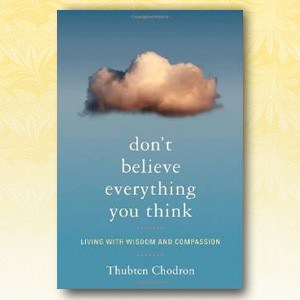Living with wisdom and compassion

A study guide for Don’t Believe Everything You Think: Living with Wisdom and Compassion.
Introduction
In the framework of Buddhist education, we deepen our understanding of teachings through a process of hearing, thinking, and meditating on what we’ve learned.
In the context of this book, hearing involves reading the text. You can also watch or listen to the talks given by Venerable Chodron and the Sravasti Abbey monastics on each verse.
To support the process of thinking, we’ve created this study guide with questions that you can contemplate on your own or discuss with a book group. We’ve also included writing prompts for those of you who like to journal to connect each verse with your own experience; akin to the personal stories you’ve read in the book.
After hearing and thinking, meditating helps us to integrate the teachings into our lives. You can structure a daily meditation practice by first doing some breathing meditation to stabilize the mind, before contemplating the meaning of a verse or two from this text and how it applies directly to your experiences and observations about life.
By engaging in this process, we gradually learn to discern which thoughts are beneficial, and which ones get in the way of us fulfilling our aspirations. By transforming our minds moment by moment, we practice living with wisdom and compassion instead of on automatic, in order to actualize our full human potential to benefit all sentient beings.
Chapter 1: Helpful background
Discussion questions
-
What subjects do your thoughts often revolve around? Make a list of the matters that are usually on your mind.
-
What emotions arise in relation to the subjects that you usually think about? How do these emotions affect your behavior and relationships with others?
-
From your observation, how does what you think about affect your life?
-
Have you tried ways to change what you think about and the way you think? What was the effect?
Writing Prompt
How do you view your body and mind, and how does that relate to your idea of who you are? How are your views similar or different to the Buddhist perspective on how the body and mind exist?
Chapter 2: Starting out on the path
Discussion questions
-
How would you describe your outlook on life? What do you think makes life meaningful?
-
What led you to take an interest in spiritual teachings, and what is your motivation for studying them?
-
Think of one habitual emotional or behavioral pattern in your life. What causes and conditions brought it about? Has it been beneficial to your life?
-
With your current lifestyle, is it easy for you to calm your mind? What are some ways in which you can simplify your life?
Writing prompt
Describe a familiar relationship situation that brings up disturbing emotions for you. Then, rewrite the story, imagining that you behave in a way that changes the old relationship dynamic. What might you think, say, or do to shift your interactions towards a beneficial outcome?
Chapter 3: Transitioning
Discussion questions
-
Growing up, what was your family’s attitude towards death? How has it shaped your own views about death?
-
When did you first become aware of death, and what was the impact of this on your mind? How does the awareness of death affect the way you live your life
-
When faced with difficulties, where do you turn for support? Do you take refuge in worldly or spiritual resources?
-
Would you say that you have a clear sense of spiritual refuge? Why or why not?
Writing prompt
Write about someone whom you consider a “bad friend” and someone whom you consider a “good friend.” What types of activities did you engage in, and what were your interactions like with each friend? What kinds of friendships would you like to cultivate moving forward, and what kind of friend would you like to be for others?
Chapter 4: The next step
Discussion questions
-
Think about a time when you experienced suffering in your life. What did you identify to be the cause or causes of your suffering?
-
What are your thoughts on the idea that suffering comes about due to our past destructive actions, both in this life and past lives?
-
How would you define happiness?
-
What do you consider to be the causes of happiness?
Writing prompt
Write about a time when you exerted a great amount of effort to obtain an external object that you desired. What did you do to achieve your goal, and what was the outcome? How did this experience affect your mind, your behavior, and your relationships with others?
Chapter 5: Cultivating love, compassion, and altruism
Discussion questions
-
What are your attitudes towards your loved ones, and the people whom you find difficult? Are there people in your life who would fall into both categories?
-
What are some good qualities that you learned from your parents or childhood caregivers? How has what you learned from them shaped your life?
-
Think of a time when you experienced kindness from a stranger, or when you practiced kindness towards a stranger. How did the incident make you feel?
-
How have you tried to repay the kindness of others? Are there other ways of repaying their kindness that you might like to put into practice?
Writing prompt
Describe someone who has been a friend, enemy, and stranger to you at different points in your relationship. What does this suggest about these labels?
Chapter 6: Transforming distressing events
Discussion questions
-
Think of a situation that you considered a disappointment or obstacle. Why did you label it in this way? Are there other perspectives from which you can view the same situation?
-
How do you deal with disappointments and obstacles in your life? Has your approach changed over time?
-
How do you feel and respond when people praise or blame you?
-
What are your thoughts about cultivating compassion for people who have harmed you, or who have done actions you consider despicable?
Writing prompt
Describe a time when someone criticized or humiliated you publicly. How did you respond? Looking back, would you have handled the situation differently?
Chapter 7: Dealing with difficulties
Discussion questions
-
Think of a time when you betrayed someone else’s trust. What reasons did you give to justify your actions? What was the other person’s response?
-
Think of a time when someone betrayed your trust. What reasons did they give to justify their actions? What was your response?
-
What lessons have you learned from interactions with people whom you find difficult?
-
What is your attitude towards worldly fortune and success? How has that shaped the choices you have made in your life?
Writing prompt
Imagine if your self-centered thought were a living being – what would he/ she/ it look like, and what would he/ she/ it say? Describe the appearance of your self-centered thought as a living being, and write a monologue from his/ her/ its perspective.
Chapter 8: The hated and the desired
Discussion questions
-
What are some of the triggers—people, objects, or situations—that cause anger and attachment to arise in your mind?
-
How do anger and attachment affect your body, speech, and mind?
-
What methods have you tried to work with anger and attachment? Have these methods been effective?
-
What obstacles have come up for you when trying to subdue your anger and attachment?
Writing prompt
Which is a stronger driving force in your life, attachment or anger? Write about how either one or both of these mental states have influenced your choices and the effect this has had on your life.
Chapter 9: The true nature
Discussion questions
-
How would you describe yourself? Are there particular identities that you often use to define yourself? (E.g. gender, nationality, sexuality, etc.) How does this affect the way you see yourself and others?
-
What are some of the people, situations or objects that you hold on to? How has holding on to them affected your life?
-
Think of a time when you experienced a great loss. What emotions came up for you, and how did you work with them?
-
What do you think about the idea of seeing yourself and objects of attachment and aversion as illusory? How might viewing things in this way change your perspective on the world?
Writing prompt
Write about the experience of letting go of a person, situation or object that you have strong attachment towards. What was your emotional experience before, during, and after this process?
Chapter 10: Practices to last a lifetime
Discussion questions
-
Think back to when you first started reading this book. Has your motivation for engaging in spiritual study and practice changed since then? How so?
-
What expectations do you have around your spiritual practice? Are these expectations helpful or are they a hindrance?
-
Which of the six far-reaching practices do you find the easiest to put into practice? What effect has this had on your life?
-
What obstacles arise for you when you try to practice the six far-reaching practices? How might you work with these obstacles?
Writing prompt
Describe an incident that challenged what you took for granted about your life. How did the incident change your perspective on life and the way you live?
Chapter 11: Joyfully staying on the path
Discussion questions
-
How do you usually respond when you realize that you have made a mistake, or that you have harmed others? Is your habitual reaction beneficial or harmful?
-
How do you usually respond when you see that others have made a mistake, or that they have harmed you or your loved ones? Is your habitual reaction beneficial or harmful?
-
How has your spiritual practice changed the way you relate to yourself and others?
-
What are some of the negative attitudes you would like to be more mindful of, and the positive mental states you would like to cultivate?
Writing prompt
Write about some of the positive changes that you have made and experienced through your spiritual practice. Rejoice in the effort you have made to transform your mind for the benefit of others and yourself.


